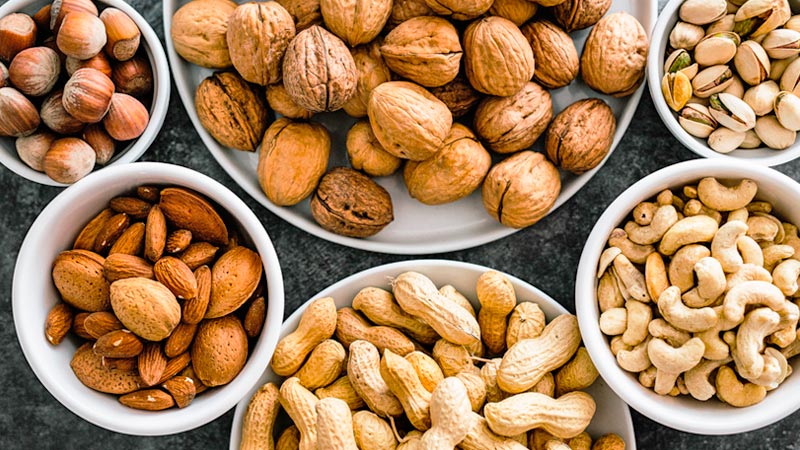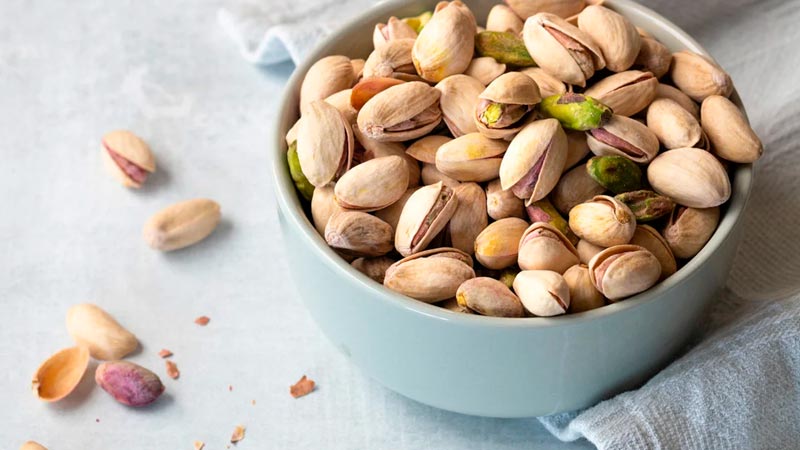Nuts are a delicious and healthy snack that provide a variety of nutrients and health benefits. From heart-healthy fats to antioxidants and protein, nuts are a great addition to any diet.
Table of Contents
However, not all nuts are created equal when it comes to their nutritional value.
When it comes to choosing the best nuts for health, there are a few factors to consider. First, it's important to look at the nutrient profile of each nut. Some nuts are higher in certain nutrients than others, so choosing a variety of nuts can help ensure you're getting a range of nutrients. Additionally, it's important to consider portion sizes, as nuts are high in calories and can easily lead to overconsumption if not eaten in moderation.
In this article, we will explore the best nuts for health and their unique nutritional profiles. We will also provide tips for incorporating nuts into your diet in a healthy way. Whether you're looking for a quick snack or a way to boost your nutrient intake, nuts can be a great choice for overall health and wellness.
The Importance of Nuts in a Healthy Diet
Nuts are a highly nutritious food that should be included in a healthy diet. They are a good source of protein, healthy fats, fiber, and a variety of vitamins and minerals. Nuts are also a great snack option because they are portable, easy to store, and can be eaten on the go.
Eating nuts on a regular basis has been linked to a number of health benefits. Studies have shown that consuming nuts can help reduce the risk of heart disease, lower cholesterol levels, and improve blood sugar control.
Nuts have also been found to be beneficial for weight management, as they are high in protein and fiber, which can help keep you feeling full and satisfied.
There are many different types of nuts to choose from, each with its own unique nutritional profile. Some of the most popular nuts include almonds, walnuts, cashews, and pistachios. Each of these nuts has its own set of health benefits, so it's important to include a variety of nuts in your diet.
Overall, nuts are a healthy and delicious addition to any diet. They are packed with nutrients and can help improve your overall health and well-being. So next time you're looking for a snack, reach for a handful of nuts and enjoy all the benefits they have to offer.
Almonds

Nutritional Value
Almonds are a rich source of nutrients and minerals that are essential for good health. A 1-ounce serving of almonds (approximately 23 almonds) contains:
- Calories: 164
- Fat: 14.2 grams (9 grams of which are monounsaturated fat)
- Protein: 6 grams
- Carbohydrates: 6 grams
- Fiber: 3.5 grams
- Vitamin E: 37% of the RDI (Recommended Daily Intake)
- Magnesium: 20% of the RDI
- Phosphorus: 13% of the RDI
- Copper: 14% of the RDI
Health Benefits
Almonds have several health benefits due to their high nutrient content. Some of the benefits are:
-
Heart Health: Almonds are rich in monounsaturated fats, which are good for the heart. They also contain antioxidants that help reduce inflammation and lower the risk of heart disease.
-
Weight Loss: Almonds are a good source of protein and fiber, which can help keep you full for longer periods and reduce the overall calorie intake.
-
Blood Sugar Control: Almonds have a low glycemic index, which means they do not cause a spike in blood sugar levels. They are also rich in magnesium, which helps regulate blood sugar levels.
-
Brain Health: Almonds are a good source of vitamin E, which is essential for brain health. Studies have shown that vitamin E can help reduce the risk of cognitive decline and Alzheimer's disease.
In conclusion, almonds are a nutritious and healthy snack that can provide several health benefits.
Walnuts

Nutritional Value
Walnuts are a nutrient-dense food that provides various vitamins, minerals, and healthy fats. A 1-ounce (28-gram) serving of walnuts contains:
- Calories: 185
- Protein: 4.3 grams
- Fat: 18.5 grams
- Carbs: 3.9 grams
- Fiber: 1.9 grams
- Vitamin E: 1% of the Daily Value (DV)
- Magnesium: 11% of the DV
- Phosphorus: 9% of the DV
- Copper: 10% of the DV
Walnuts are also a good source of plant-based omega-3 fatty acids, which are essential for brain function and heart health.
Health Benefits
Consuming walnuts regularly may have several health benefits, such as:
- Improved heart health: Walnuts have been shown to lower LDL (bad) cholesterol levels and reduce the risk of heart disease.
- Reduced inflammation: Walnuts contain polyphenols and other antioxidants that may help reduce inflammation in the body.
- Better brain function: The omega-3 fatty acids in walnuts may improve brain function and reduce the risk of age-related cognitive decline.
- Lowered risk of certain cancers: Some studies suggest that consuming walnuts may reduce the risk of breast and prostate cancers.
Overall, walnuts are a nutritious and delicious addition to a healthy diet.
Pistachios
Nutritional Value
Pistachios are a nutrient-dense food that is packed with essential nutrients. A one-ounce serving of pistachios contains approximately 160 calories, 6 grams of protein, and 3 grams of fiber. Pistachios are also a good source of healthy fats, including monounsaturated and polyunsaturated fats.
In addition to healthy fats, pistachios are also a good source of vitamins and minerals. A one-ounce serving of pistachios contains approximately 10% of the daily recommended intake of vitamin B6, thiamin, and phosphorus, and 15% of the daily recommended intake of copper.
Health Benefits
Pistachios have been linked to several health benefits. Here are some of the potential health benefits of consuming pistachios:
-
Heart health: Pistachios are a good source of healthy fats, which have been linked to improved heart health. Studies have shown that consuming pistachios can help reduce LDL (bad) cholesterol levels and lower the risk of heart disease.
-
Weight management: Pistachios are a low-calorie, high-protein snack that can help promote feelings of fullness and reduce overall calorie intake. Studies have shown that consuming pistachios can help support weight loss and weight management.
-
Blood sugar control: Pistachios are a low-glycemic index food, which means they can help regulate blood sugar levels. Studies have shown that consuming pistachios can help improve insulin sensitivity and reduce the risk of type 2 diabetes.
Overall, pistachios are a nutrient-dense food that can provide several potential health benefits. Incorporating pistachios into a balanced diet can be a healthy and delicious way to support overall health and well-being.
Cashews
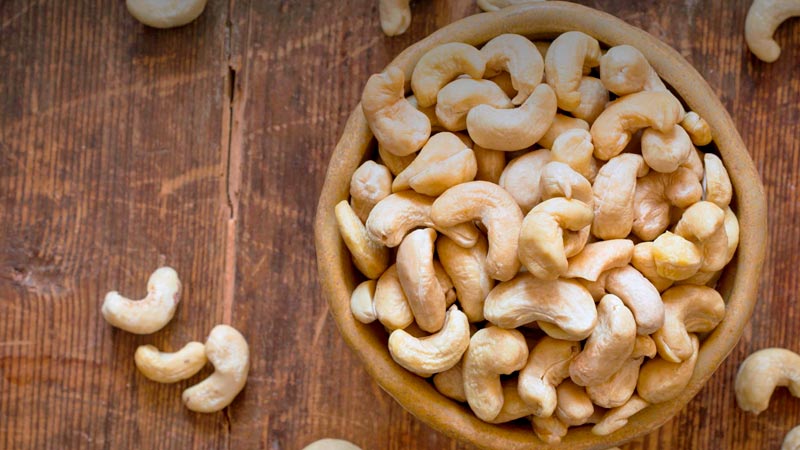
Nutritional Value
Cashews are a nutrient-dense food that can provide a variety of essential vitamins and minerals. They are a good source of healthy fats, fiber, and protein. Here are some of the key nutrients found in cashews:
| Nutrient | Amount per 1 oz (28 g) |
|---|---|
| Calories | 157 |
| Fat | 12 g |
| Carbohydrates | 9 g |
| Fiber | 1 g |
| Protein | 5 g |
| Vitamin E | 1 mg |
| Magnesium | 83 mg |
| Phosphorus | 168 mg |
| Copper | 0.6 mg |
| Manganese | 0.5 mg |
Health Benefits
Cashews have been linked to a number of potential health benefits. Here are a few:
- Heart Health: Cashews are high in monounsaturated and polyunsaturated fats, which can help improve cholesterol levels and lower the risk of heart disease.
- Bone Health: Cashews are a good source of magnesium, phosphorus, and copper, all of which are important for healthy bones.
- Weight Management: Despite being relatively high in calories, cashews can be a good addition to a weight loss diet. They are high in protein and fiber, which can help you feel full and satisfied.
- Antioxidants: Cashews are a good source of antioxidants, which can help protect the body against damage from free radicals. Vitamin E is one of the antioxidants found in cashews.
Overall, cashews can be a healthy addition to a balanced diet. However, it's important to keep portion sizes in mind, as they are relatively high in calories.
Hazelnuts
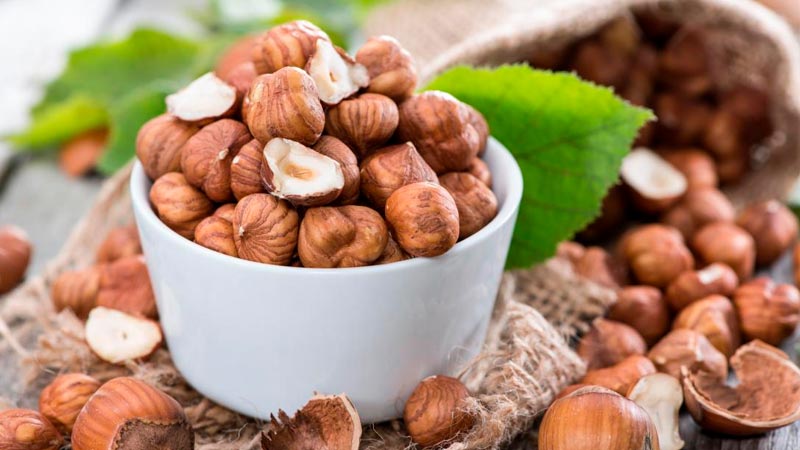
Nutritional Value
Hazelnuts are a great source of healthy fats, fiber, and vitamins. Here is a breakdown of the nutritional value of hazelnuts per 100 grams:
| Nutrient | Amount |
|---|---|
| Calories | 628 |
| Protein | 14.95g |
| Fat | 60.75g |
| Carbohydrates | 16.70g |
| Fiber | 9.7g |
| Sugar | 4.34g |
| Calcium | 114mg |
| Iron | 4.7mg |
| Magnesium | 163mg |
| Phosphorus | 290mg |
| Potassium | 680mg |
| Sodium | 0mg |
| Zinc | 2.45mg |
| Copper | 1.75mg |
| Manganese | 6.17mg |
Health Benefits
Hazelnuts have several health benefits, including:
- Heart health: Hazelnuts are rich in monounsaturated and polyunsaturated fats, which can help lower LDL cholesterol levels and reduce the risk of heart disease.
- Digestive health: The high fiber content in hazelnuts can aid in digestion and prevent constipation.
- Brain health: Hazelnuts contain vitamin E, which is an antioxidant that can protect the brain from oxidative stress and improve cognitive function.
- Bone health: Hazelnuts are a good source of calcium, magnesium, and phosphorus, which are essential for maintaining healthy bones.
- Skin health: Hazelnuts contain vitamin E and other antioxidants that can protect the skin from damage caused by UV radiation and other environmental factors.
Overall, hazelnuts are a nutritious and delicious addition to a healthy diet.
Brazil Nuts
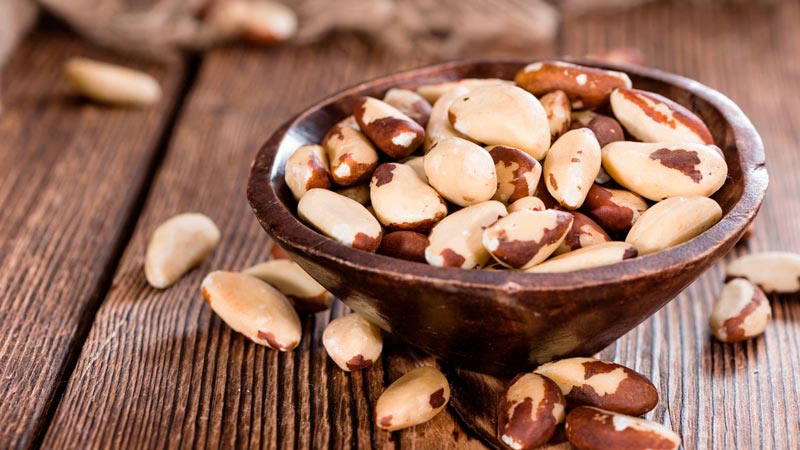
Nutritional Value
Brazil nuts are a great source of nutrients and minerals. A single serving of Brazil nuts (approximately 28 grams) contains:
- Calories: 185
- Protein: 4 grams
- Fat: 19 grams
- Carbohydrates: 3 grams
- Fiber: 2 grams
- Selenium: 988% of the daily value (DV)
- Magnesium: 26% of the DV
- Phosphorus: 20% of the DV
- Copper: 15% of the DV
- Manganese: 17% of the DV
Health Benefits
Brazil nuts are known for their high selenium content, which is essential for the proper functioning of the immune system and thyroid gland. Selenium is also important for maintaining healthy hair, skin, and nails. However, it is important to note that excessive selenium intake can be harmful, so it is recommended to limit Brazil nut consumption to one to two nuts per day.
In addition to selenium, Brazil nuts contain other important nutrients such as magnesium, phosphorus, and copper. These minerals are essential for bone health, nerve function, and energy production.
Brazil nuts are also a good source of healthy fats, including monounsaturated and polyunsaturated fats. These fats can help lower cholesterol levels and reduce the risk of heart disease.
Overall, Brazil nuts are a nutritious and delicious addition to a healthy diet.
Pecans

Nutritional Value
Pecans are a type of nut that are commonly used in cooking and baking. They are high in calories, with one ounce (28 grams) containing approximately 200 calories. However, they are also rich in nutrients such as:
- Fiber: Pecans are a good source of dietary fiber, which can help promote digestive health and prevent constipation.
- Protein: Pecans contain protein, which is essential for building and repairing tissues in the body.
- Healthy Fats: Pecans are high in monounsaturated and polyunsaturated fats, which can help reduce the risk of heart disease.
- Vitamins and Minerals: Pecans contain a variety of vitamins and minerals, including vitamin E, magnesium, and zinc.
Health Benefits
In addition to their nutritional value, pecans also offer a number of health benefits. Some of these benefits include:
- Heart Health: Pecans contain antioxidants and healthy fats that can help reduce the risk of heart disease.
- Blood Sugar Control: Pecans may help improve blood sugar control in people with type 2 diabetes.
- Bone Health: Pecans are a good source of magnesium, which is important for maintaining strong bones.
- Weight Management: Despite their high calorie content, research suggests that incorporating pecans into a healthy diet may actually help with weight management.
Overall, pecans are a nutritious and delicious addition to any diet.
Macadamia Nuts
Nutritional Value
Macadamia nuts are known for their rich, buttery taste and are a good source of essential nutrients. They are high in healthy fats, fiber, and various vitamins and minerals. A 1-ounce (28-gram) serving of macadamia nuts contains:
- Calories: 204
- Protein: 2.2 grams
- Total fat: 21.5 grams
- Saturated fat: 3 grams
- Carbohydrates: 3.9 grams
- Fiber: 2.4 grams
- Sugar: 1.4 grams
- Iron: 6% of the Daily Value (DV)
- Thiamine: 9% of the DV
- Manganese: 58% of the DV
Health Benefits
Macadamia nuts have several health benefits due to their nutrient content. Here are a few potential health benefits of consuming macadamia nuts:
- Heart health: Macadamia nuts are high in monounsaturated and polyunsaturated fats, which can help improve cholesterol levels and reduce the risk of heart disease.
- Gut health: The fiber content in macadamia nuts can help promote healthy digestion and prevent constipation.
- Brain health: Macadamia nuts are a good source of thiamine, a B-vitamin that is important for brain function. Thiamine can help improve memory and cognitive function.
- Bone health: Macadamia nuts are a good source of manganese, which is essential for bone health. Manganese can help improve bone density and reduce the risk of osteoporosis.
Overall, macadamia nuts are a nutritious and delicious snack that can provide several health benefits when consumed as part of a balanced diet.
Peanuts
Nutritional Value
Peanuts are a great source of nutrients, including protein, fiber, and healthy fats. They are also rich in vitamins and minerals, such as vitamin E, magnesium, and potassium. Here is a table that shows the nutritional value of 1 ounce (28 grams) of dry-roasted peanuts:
| Nutrient | Amount |
|---|---|
| Calories | 161 |
| Protein | 7 grams |
| Fat | 14 grams |
| Carbohydrates | 4 grams |
| Fiber | 2 grams |
| Vitamin E | 21% of the Daily Value (DV) |
| Magnesium | 11% of the DV |
| Phosphorus | 10% of the DV |
| Potassium | 5% of the DV |
Health Benefits
Peanuts have been linked to several health benefits. Here are some of them:
-
Heart health: Peanuts contain monounsaturated and polyunsaturated fats, which can help lower LDL cholesterol levels and reduce the risk of heart disease.
-
Weight management: Despite being high in calories, peanuts can help with weight management due to their high protein and fiber content, which can help you feel full and satisfied.
-
Blood sugar control: Peanuts have a low glycemic index and can help regulate blood sugar levels, making them a good snack option for people with diabetes.
-
Brain health: Peanuts are a good source of vitamin E, which has been linked to improved cognitive function and a reduced risk of Alzheimer's disease.
-
Anti-inflammatory effects: Peanuts contain resveratrol, a compound with anti-inflammatory properties that may help reduce the risk of chronic diseases, such as cancer and heart disease.
Overall, peanuts are a nutritious and delicious snack that can provide many health benefits when consumed as part of a balanced diet.
How to Incorporate Nuts into Your Diet
Incorporating nuts into your diet is easy and can be done in many ways. Here are a few ideas to get you started:
-
Snack on nuts: Nuts make for a great snack. Keep a small container of mixed nuts at your desk or in your bag for when you need a quick and healthy snack.
-
Add nuts to your breakfast: Sprinkle some chopped nuts on your cereal or oatmeal for an extra crunch and boost of protein.
-
Use nuts as a topping: Add chopped nuts to your salads, yogurt, or smoothie bowls for added texture and flavor.
-
Make nut butter: Nut butter is a great alternative to regular butter or spreads. Spread it on toast or use it as a dip for fruits and vegetables.
-
Use nuts in cooking: Nuts can be used in a variety of dishes, from stir-fries to baked goods. Try adding chopped nuts to your next stir-fry or using almond flour in your baking.
Remember to choose unsalted or low-salt nuts to avoid excessive sodium intake. Additionally, be mindful of portion sizes as nuts are high in calories. A small handful (about 1 ounce) is a good serving size.
Potential Allergies and Intolerances
When it comes to consuming nuts, it is important to note that some people may have allergies or intolerances to certain types. Here are some of the potential allergies and intolerances associated with nuts:
Peanut Allergy
Peanut allergy is one of the most common allergies, and it can cause severe reactions in some individuals. People with this allergy should avoid all products that contain peanuts, including peanut butter, peanut oil, and peanut flour.
Tree Nut Allergy
Tree nut allergy is another common allergy, and it can also cause severe reactions. Tree nuts include almonds, cashews, walnuts, and pistachios, among others. People with this allergy should avoid all products that contain tree nuts.
Other Nut Allergies
In addition to peanut and tree nut allergies, some people may have allergies to other types of nuts, such as sesame seeds or sunflower seeds. It is important to read ingredient labels carefully and avoid any products that contain allergens.
Nut Intolerances
Some people may not have a true allergy to nuts, but they may experience uncomfortable symptoms after consuming them. This is known as a nut intolerance. Symptoms may include digestive issues, such as bloating, gas, and diarrhea. If you experience these symptoms after consuming nuts, you may want to avoid them or limit your intake.
Overall, it is important to be aware of potential allergies and intolerances when consuming nuts. If you have any concerns, it is best to speak with a healthcare professional.
Conclusion
In conclusion, nuts are a great addition to any healthy diet. They provide a variety of essential nutrients and healthy fats that can benefit overall health. While each type of nut has its unique nutritional profile, all nuts offer significant health benefits.
Nuts are an excellent source of protein, fiber, and healthy fats. They are also rich in vitamins and minerals such as vitamin E, magnesium, and potassium. Incorporating a variety of nuts into your diet can help you meet your daily nutrient requirements.
Nuts have been shown to have numerous health benefits, including reducing the risk of heart disease, improving brain function, and aiding in weight loss. However, it is important to note that nuts are high in calories, so they should be consumed in moderation.
Overall, nuts are an excellent food to include in a healthy diet. They are a convenient and tasty snack that can help you meet your daily nutrient needs. By incorporating a variety of nuts into your diet, you can enjoy their numerous health benefits and improve your overall health and well-being.
Eat well, live better!
